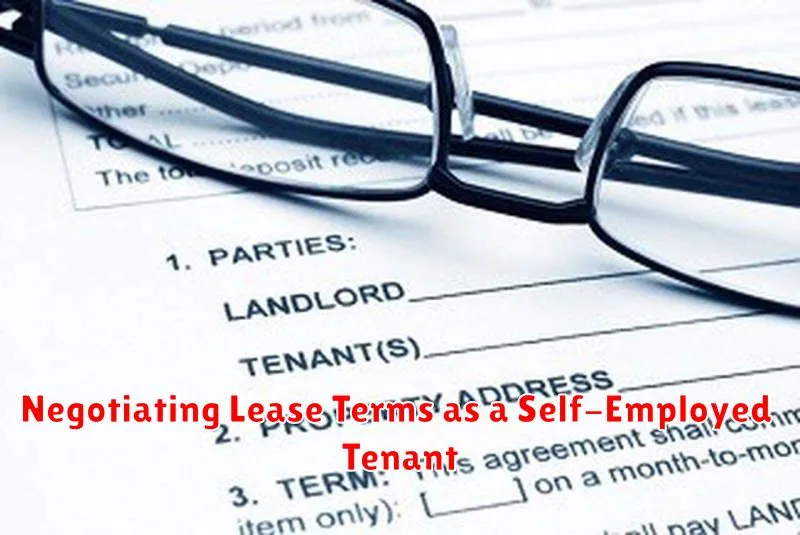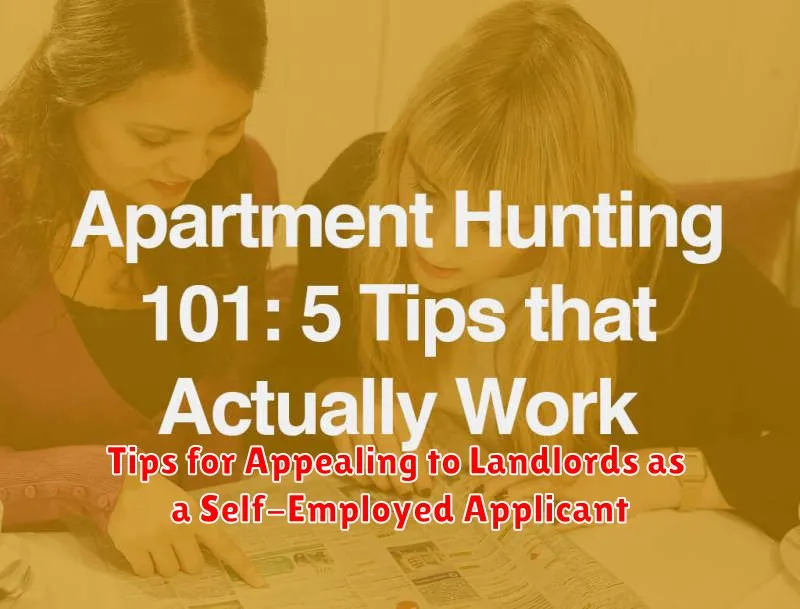Are you a self-employed individual looking to rent an apartment? Navigating the rental market can be tricky, especially when traditional income verification methods don’t apply to your situation. Don’t worry, it’s not impossible! This article will guide you through the process of renting an apartment as a self-employed individual, offering practical tips and strategies to help you secure your dream home. We’ll cover everything from preparing your financial documents to finding landlords who are open to working with self-employed tenants. Let’s dive in!
Understanding Landlord Requirements for Self-Employed Applicants
Landlords may have certain requirements for self-employed individuals, as they want to ensure you can afford the rent. They may ask for documentation showing your income and financial stability. This could include:
- Bank statements: These show your income and spending patterns. Landlords may want to see at least three months’ worth of statements.
- Tax returns: Your tax return shows your income and deductions for the previous year.
- Profit and loss statements: These are financial statements that show your business’s income and expenses.
- Letters of credit: These are letters from a bank or other financial institution guaranteeing payment.
Landlords may also ask for a credit check, even if you’re self-employed. This helps them gauge your financial responsibility. Be prepared to provide this information in advance to speed up the rental application process.
It’s also important to be upfront and honest about your financial situation. If you have any concerns about meeting the landlord’s requirements, talk to them directly. They may be willing to work with you if you’re transparent and have a solid plan.
Documenting Your Income as a Freelancer or Business Owner
When applying to rent an apartment as a freelancer or business owner, you’ll need to prove your income to your landlord. This can be challenging since you don’t receive a traditional W-2 from an employer. Landlords may require you to submit bank statements, tax returns, or profit and loss statements to verify your income.
For bank statements, make sure to include at least three months’ worth, showing regular income deposits. If you’re a freelancer or business owner who gets paid inconsistently, you may need to provide more documentation.
For tax returns, provide copies of your most recent federal and state tax returns. These should be filed with the IRS and state tax agencies, respectively. This is a great way to showcase your yearly earnings.
Lastly, you can also provide a profit and loss statement. This is a financial report that shows your business’s revenue and expenses for a specific period of time. You can create one using accounting software or a spreadsheet.
It’s best to be prepared to provide multiple forms of documentation as landlords may have specific requirements. Remember to be proactive and communicate with your potential landlord about your income documentation. Be organized and present a clear and accurate picture of your financial situation.
Building a Strong Rental Application as a Self-Employed Individual
Being self-employed can be a wonderful thing, but it can also present challenges when trying to rent an apartment. Landlords often prefer tenants with steady, predictable income, which can be tricky to prove when you’re the boss. Fortunately, there are things you can do to strengthen your rental application and make yourself a more attractive candidate.
The key is to demonstrate financial stability. This means providing documentation that shows consistent income. Landlords may ask for bank statements, tax returns, or even profit and loss statements. They want to see that you’re bringing in enough money to comfortably afford the rent and other expenses associated with living in the apartment.
You can also consider providing a letter of explanation. This letter can detail your income history, the nature of your self-employment, and any other relevant information that might address any concerns a landlord may have. You might mention how long you’ve been self-employed, any awards or recognition you’ve received, and your future business plans.
Be proactive and address potential concerns before they even arise. Showing that you’re organized and transparent can go a long way in building trust with a potential landlord. By taking the time to present a strong and comprehensive rental application, you can increase your chances of securing the apartment you want.
Highlighting Your Reliability and Financial Stability
Landlords may have concerns about your ability to pay rent consistently if you’re self-employed. To ease their minds, be prepared to demonstrate your financial stability. This means providing documentation that shows you have a steady income.
Here are some ways to show your financial stability:
- Provide bank statements from the past six to twelve months, showcasing consistent deposits.
- Submit tax returns from the previous year or two, showing your income and expenses.
- Offer a letter of credit from your bank, guaranteeing your ability to cover rent.
- Show a strong credit score, which reflects your financial responsibility.
- Provide a business plan if you’re a new business owner, outlining your expected income and expenses.
By being transparent and proactive with your financial documentation, you can assure landlords that you’re a reliable tenant who can afford the rent.
Finding Apartments That Are Friendly to Self-Employed Renters
When you’re self-employed, it can be difficult to find apartments that are willing to rent to you. Landlords often prefer tenants with steady income from a traditional job, so they may be hesitant to rent to someone who has a less traditional income stream. But don’t worry, there are still ways to find an apartment that’s friendly to self-employed renters.
One thing you can do is to look for landlords who are open to working with self-employed tenants. You can do this by asking around, talking to other self-employed people in your area, or searching online. There are also some rental websites that specifically cater to self-employed renters.
Another important factor to consider is the credit history. Landlords often use credit history as a way to assess a tenant’s financial stability. If you have a good credit history, it will be easier to find an apartment, even if you’re self-employed. If you’re concerned about your credit history, you can work on improving it by paying your bills on time and reducing your debt.
You can also offer to pay a larger security deposit or first month’s rent to show the landlord that you are a reliable tenant. You can also provide them with your bank statements and tax returns to show them that you have a steady income. This can help to ease their concerns about your financial stability.
Lastly, be prepared to answer questions about your income and employment. Landlords may ask for documentation to verify your income, such as tax returns, bank statements, or profit and loss statements. Be prepared to provide these documents and be honest about your financial situation.
Finding an apartment as a self-employed renter can be challenging, but it is not impossible. By doing your research and being prepared to provide documentation of your income, you can find a place that is a good fit for you. Remember, be patient and persistent, and don’t give up!
Negotiating Lease Terms as a Self-Employed Tenant

Landlords often prefer tenants with steady employment, and being self-employed can make it harder to qualify. However, with some strategic planning and negotiation, you can increase your chances of securing a lease agreement.
First, be prepared to provide documentation that demonstrates your financial stability. This could include bank statements, tax returns, and client contracts. You may also want to offer a larger security deposit or a longer lease term as a sign of your commitment.
Second, consider negotiating lease terms that are beneficial for your self-employed status. For example, request the ability to sublet the unit if your work requires you to travel frequently. You may also want to discuss flexible lease terms that accommodate potential changes in your income or work schedule.
Remember, landlords are often willing to work with tenants who are honest and upfront about their situation. By being transparent and prepared, you can demonstrate your reliability and increase your chances of securing a rental agreement.
Securing a Guarantor or Co-Signer if Needed

If you’re self-employed, you might find it difficult to meet the requirements of a standard lease agreement. A guarantor or co-signer can help you secure an apartment by agreeing to be financially responsible for your rent payments in the event that you are unable to pay. This is particularly useful if you have a limited credit history or a fluctuating income.
A guarantor is someone who agrees to be financially responsible for your rent payments. They are typically a family member or close friend with good credit and a stable income. A co-signer is someone who is jointly responsible for the lease with you. They are typically someone with a good credit history and a stable income.
If you are considering asking someone to be a guarantor or co-signer for your apartment, make sure to have a clear understanding of their responsibilities. Explain the terms of the lease and your financial situation. Make sure they understand the potential financial burden they are taking on and that they are comfortable with the agreement.
It is also important to note that not all landlords accept guarantors or co-signers. Be sure to ask about their policy before you start looking for an apartment.
Tips for Appealing to Landlords as a Self-Employed Applicant

Being self-employed can be a great way to be your own boss, but it can also pose some challenges when it comes to renting an apartment. Landlords often require proof of steady income and a traditional employment history, which can be tricky for those who are self-employed. However, there are several things you can do to appeal to landlords and show that you’re a reliable tenant.
First, be prepared to provide documentation of your income. This could include bank statements, tax returns, or profit and loss statements. You can also provide a letter of explanation detailing your self-employment income and expenses. Be transparent and honest about your financial situation. Landlords want to see that you have a consistent income stream that will allow you to pay rent on time.
Second, consider offering a higher security deposit. This is a common practice for self-employed renters and can be viewed as a sign of your financial stability and commitment to the lease agreement. If you’re willing to offer a higher deposit, landlords might be more inclined to overlook the lack of traditional employment history.
Third, be prepared to discuss your business and its stability. Landlords might want to know about the nature of your business, its growth potential, and your plans for the future. This can help them feel confident that you’ll be able to maintain a steady income stream and continue paying rent in the long term.
Finally, be proactive in the application process. Submit all the required documentation promptly, respond to any inquiries quickly, and be upfront about your financial situation. Landlords appreciate transparency and responsiveness, which can help you stand out among other applicants.
Common Mistakes to Avoid When Renting as a Self-Employed Individual
Landlords often have specific requirements for self-employed individuals due to the perceived risks associated with their income stream. While landlords generally look for consistent and reliable income, proving this as a self-employed individual can be challenging.
Here are some common mistakes to avoid when renting as a self-employed individual:
- Not having proper documentation: You must provide verifiable income documentation to demonstrate your ability to afford rent. This could include bank statements, tax returns, profit and loss statements, and client contracts.
- Underestimating income variability: Landlords are wary of fluctuating income streams. Be transparent about your income variability and explain your income sources to ensure they understand your financial stability.
- Failing to build credit history: A good credit score is essential for securing an apartment, regardless of your employment status. Ensure you pay your bills on time and maintain a positive credit history.
- Not being prepared for a higher security deposit: Some landlords may require a higher security deposit from self-employed individuals to mitigate their perceived risk. Be prepared to pay a larger deposit.
- Not being proactive: When applying for an apartment, be proactive in communicating with the landlord and address any concerns they may have about your income.
By understanding these common mistakes and taking the necessary steps to address them, you can significantly increase your chances of securing a rental property as a self-employed individual.
Preparing for the Application Process
When you’re self-employed, landlords may have some concerns about your ability to pay rent consistently. To ease their worries and increase your chances of getting approved, it’s important to be prepared for the application process.
Here’s what you should do:
- Gather your documentation: Landlords will likely ask for pay stubs, bank statements, and tax returns to verify your income. Be ready to provide these documents quickly and easily.
- Prepare a letter of explanation: Write a brief letter explaining your self-employment situation and your income stream. Highlight your financial stability and your commitment to paying rent on time.
- Consider a guarantor: If you’re concerned about your income history, a guarantor can help. A guarantor is someone who agrees to be financially responsible for your rent if you default. This can be a family member, friend, or even a co-signer.
- Be upfront about your situation: Don’t be afraid to be open about your self-employment status. Landlords appreciate transparency and honesty.
By being prepared, you can demonstrate your financial reliability and improve your chances of securing your dream apartment.

